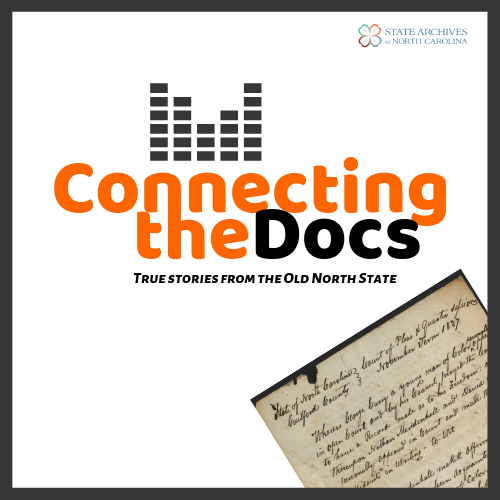
Episodes
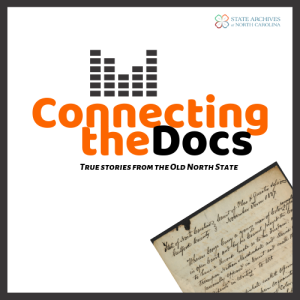
Wednesday Nov 22, 2023
We Beg Your Pardon: The Saga of Slow Poke
Wednesday Nov 22, 2023
Wednesday Nov 22, 2023
Happy Holidays! We all have heard of presidential pardons for turkeys at Thanksgiving. Of course, we know that since the first state constitution in 1776, North Carolina governors have had the ability to declare executive clemency to people. But have you heard of a governor pardoning a possum? In this episode we are joined by Records Description Archivist Mike Childs to learn about Slow Poke the Possum of Harnett County, the only possum to be officially pardoned from his sentence to be eaten! Slow Poke’s incredible journey begins in 1970, when he was entered into a beauty contest. The winner of the contest would be subject to Possum Pickin’ Day, a celebration championed by North Carolina Governor Bob Scott, who often partook in eating possums, a rural delicacy. When Slow Poke won the beauty contest and his fate was set, public outcry led Governor Scott to make history by pardoning the possum from becoming his next main course. Long live Slow Poke!
Resources:
SR.370.2.242: Governor Robert Scott Record Group, General Correspondence, Governor's File, Political Folder - Releases, Press, January-March: Proclamations Folder (Box 242)
SR.370.2.257: General Correspondence, Governor's File, Statements, E-Q: Folder H (Box 257)
SR.370.2.257: General Correspondence, Governor's File, Statements, E-Q: Folder P-Q (Box 257)
SR.370.17.7: Executive Mansion Files, 1970 Correspondence, August-December; Invitations Declined, January-February (Box 7)
PC.1317: Robert Scott II Papers, 2011 Addition, Scrapbooks

Wednesday Nov 08, 2023
Year of the Trail: Indian Trading Paths
Wednesday Nov 08, 2023
Wednesday Nov 08, 2023
2023 marks the 50th anniversary of the NC Trails System Act, and the Department of Natural and Cultural Resources is celebrating with the Year of the Trail campaign, where all types of trails are being celebrated across the state. Join us as we continue our three-part series exploring the “sights, sounds, and people” of North Carolina’s trail system. In this episode, we take a look at the oldest trail system in our state – Indian Trading Paths. Long before Europeans arrived in the New World, American Indians utilized a network of trails and pathways across the Southeast for travel, hunting, recreation, communication, and general cultural exchange. As the area was settled by colonizers, these paths became essential in their daily life, as well. Listen in as we discuss the original main streets of North Carolina.
Primary Sources:
Outer Banks History Center Monographs (Single Volumes), “A New Voyage to Carolina,” John Lawson, (1709) 1967, 33BOK-0-59, https://docsouth.unc.edu/nc/lawson/menu.html, https://axaem.archives.ncdcr.gov//solrDetailPages/series/NCA/Series_detail.html?fq=seriesRid:759043
NC Maps, North Carolina Colony and State Maps, “An Accurate Map of North and South Carolina With Their Indian Frontiers, Shewing in a distinct manner all the Mountains, Rivers, Swamps, Marshes, Bays, Creeks, Harbours, Sandbanks and Soundings on the Coasts; with The Roads and Indian Paths; as well as The Boundary or Provincial Lines, The Several Townships and other divisions of the Land in Both Provinces; the whole from Actual Surveys by Henry Mouzon and Others (color facsimile),” (1775) 1967, MC.150.1775m.fac2 https://axaem.archives.ncdcr.gov//solrDetailPages/series/NCA/Series_detail.html?fq=seriesRid:155991

Secretary of State, Land Warrants, Plats of Survey and Related Land Grant Records, Granville County, File No. 910, Michael Synnott, 1752, ID: 12.14.66.905, SSLG 57J
https://axaem.archives.ncdcr.gov//solrDetailPages/series/NCA/Series_detail.html?fq=seriesRid:444272


Treasurer’s and Comptroller’s Papers, Indian Affairs and Lands, Cherokee Nation, “For burying Cherokee warrior Saloe on his return from Governor of Virginia,” 1770, Box 1, SR.204.18 https://axaem.archives.ncdcr.gov//solrDetailPages/series/NCA/Series_detail.html?fq=seriesRid:559906
British Records, Colonial Office: America and West Indies - Original Correspondence, Board of Trade and Secretary of State (CO 5/1-187), Secretary of State: Dispatches and Miscellaneous (CO 5/4), “Articles of Friendship and Commerce, proposed by the Lords Commissioners for Trade and Plantations, to the Deputies of the Cherokee Nation . . .,” 7 Sep. 1730, ID: 21.20.3.11 https://docsouth.unc.edu/csr/index.php/document/csr03-0067, https://axaem.archives.ncdcr.gov/solrDetailPages/series/NCA/Series_detail.html?fq=seriesRid:628689
British Records, Colonial Office: America and West Indies - Original Correspondence, Board of Trade and Secretary of State (CO 5/1-187), Secretary of State: Dispatches and Miscellaneous (CO 5/4), “Response of the Cherokee Chiefs to the Treaty Proposed by the Board of Trade,” 9 Sep. 1730, ID: 21.20.3.12 https://docsouth.unc.edu/csr/index.php/document/csr03-0067, https://axaem.archives.ncdcr.gov//solrDetailPages/series/NCA/Series_detail.html?fq=seriesRid:628690
An Interview with Gregory Richardson (b. 1951), 2023-01-26. ID: OH.010.003.
American Indian Heritage Commission Oral History Project
https://axaem.archives.ncdcr.gov/solrDetailPages/series/NCA/Series_detail.html?fq=seriesRid:1165996
Secondary Sources:
NCPedia, “Indian Trading Paths,” Tom Magnuson, 2006, https://www.ncpedia.org/indian-trading-paths

“The Trading Path and North Carolina,” Rebecca Taft Fecher, Vol. 3, No. 2, Fall 2008, UNC Greensboro – Journal of Backcountry Studies, https://libjournal.uncg.edu/index.php/jbc/article/viewFile/26/15
The American Indian in North Carolina, Douglas L. Rights, 1957, Publisher: University of Michigan – J. F. Blair
“Tracing the Trading Path,” Mark Chilton, 24 Feb. 2014, OrangePolitics.org, https://orangepolitics.org/2014/02/tracing-the-trading-path
“The Indian trading path and colonial settlement development in the North Carolina Piedmont,” Gladys Rebecca Dobbs, May 2007, UNC Chapel Hill – Carolina Digital Repository, https://cdr.lib.unc.edu/concern/dissertations/d791sh108?locale=en

Wednesday Oct 25, 2023
Year of the Trail: Mountains to Sea Trail
Wednesday Oct 25, 2023
Wednesday Oct 25, 2023
2023 marks the 50th anniversary of the NC Trails System Act, and the Department of Natural and Cultural Resources is celebrating with the Year of the Trail campaign, where all types of trails are being celebrated across the state. Join us as we embark on a three-part series where we explore the “sights, sounds, and people” of North Carolina’s trail system. In this episode, we leave the recording studio to take a hike ourselves along the Neuse River Greenway Trail in Raleigh’s own Anderson Point Park. While enjoying the trail, we’ll discuss the beginnings of the North Carolina Trails Committee after it was founded in the 1970s, specifically their efforts to develop the Mountains to the Sea Trail, designed to connect the state from the mountains to the coast.
Sources:
General Assembly Session Records, May Session 1973, House Bill 436, “An Act to Create a Scenic and Recreation Trails System and to Provide for the Designation, Administration, Regulation, and Acquisition of Scenic Trails and Trail Rights-of-Way,” SR.66.8 https://axaem.archives.ncdcr.gov//solrDetailPages/series/NCA/Series_detail.html?fq=seriesLevelId:series-31391
Parks and Recreation Record Group, Planning and Special Studies Section: North Carolina Trails Program File, Boxes 1-4, SR.85.35 https://axaem.archives.ncdcr.gov//solrDetailPages/series/NCA/Series_detail.html?fq=seriesRid:695971
“Speech by Howard N. Lee, Sept. 9, 1977,” Natural Resources and Community Development Record Group, SR.82.49, Box 02709-0002 https://axaem.archives.ncdcr.gov//solrDetailPages/series/NCA/Series_detail.html?fq=seriesRid:695140

Wednesday Oct 11, 2023
Resiliency in Records Management: Disaster Preparedness and Protecting Essential Records
Wednesday Oct 11, 2023
Wednesday Oct 11, 2023
As the conclusion of our Resiliency series, this episode shifts our focus from stories of the resilience of individual North Carolinians to information on how the State Archives can help government agencies throughout the state remain resilient in the face of disasters. In this episode, Records Description Unit Supervisor Josh Hager welcomes Records Management Consultant for Disaster Preparedness and Essential Records Kayla Leonard and Reference Archivist Katie Crickmore to the show to discuss the essential role that the State Archives has in helping agencies prepare for the effects of disasters on their records. You'll get the chance to play along as a records manager as Kayla and Josh lead Katie on a tour of the basics of identifying essential records and planning for disasters. We’ll discuss how to identify what’s essential (hint: it’s not always the most historically significant records). We’ll also play a game where you get to identify the hazards to records in an everyday workplace. You'll learn that a COOP isn’t just for chickens but is instead a critical step in disaster preparedness. Finally, you’ll learn what basic steps you can take immediately after a records disaster.
Find the Hazard Game:
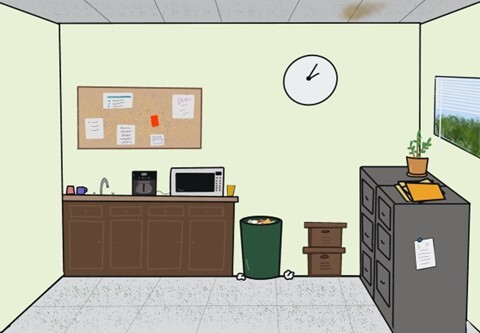
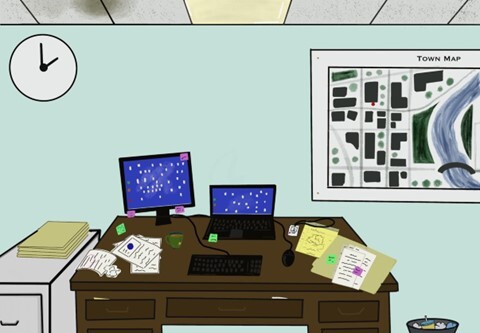
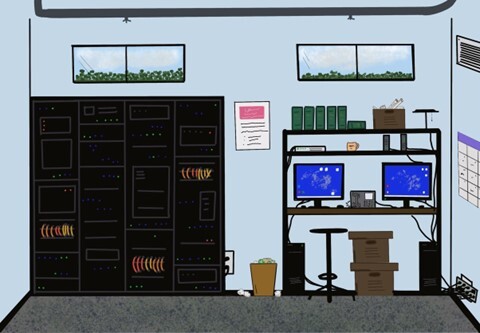
If you cannot access the images, please visit our blog: https://ncarchives.wpcomstaging.com/2023/10/11/resiliency-in-records-management-disaster-preparedness-and-protecting-essential-records/
Additional Resources:
Contact Kayla Leonard at kayla.leonard@dncr.nc.gov
Records Management Tools: https://archives.ncdcr.gov/government/rm-tools
Disaster Preparedness Resources: https://archives.ncdcr.gov/researchers/preservation/disaster-preparedness
Essential Records Overview: https://www.statearchivists.org/programs/emergency-preparedness/essential-records-er-course/handouts-essential-records-er-course/

Wednesday Sep 27, 2023
Resiliency in the Face of Natural Disasters: Other Storms and Natural Disasters
Wednesday Sep 27, 2023
Wednesday Sep 27, 2023
Resiliency is the capacity to withstand or to recover quickly from difficulties, or, to put it simply, fortitude. In the previous episode, we heard four stories of North Carolinians showing resiliency in the face of historic hurricanes, but hurricanes aren’t the only type of bad weather our state has faced. This episode showcases four more stories of resiliency shown by North Carolina citizens when facing other major storms and natural disasters. Join us as we discuss the Southern Railway Company’s emergency response to a historic mountain flood, Rebecca B. Cullum’s overcoming her fears to deliver help after a coastal blizzard, the community of Red Springs coming together to rebuild after a tornado outbreak, and the multi-agency efforts to control a blaze in a wildfire hotspot. Whether it’s individuals risking their lives for others, agencies funneling resources into rescue operations or communities coming together to rebuild, North Carolinians are absolutely resilient!
Tornado Maps:
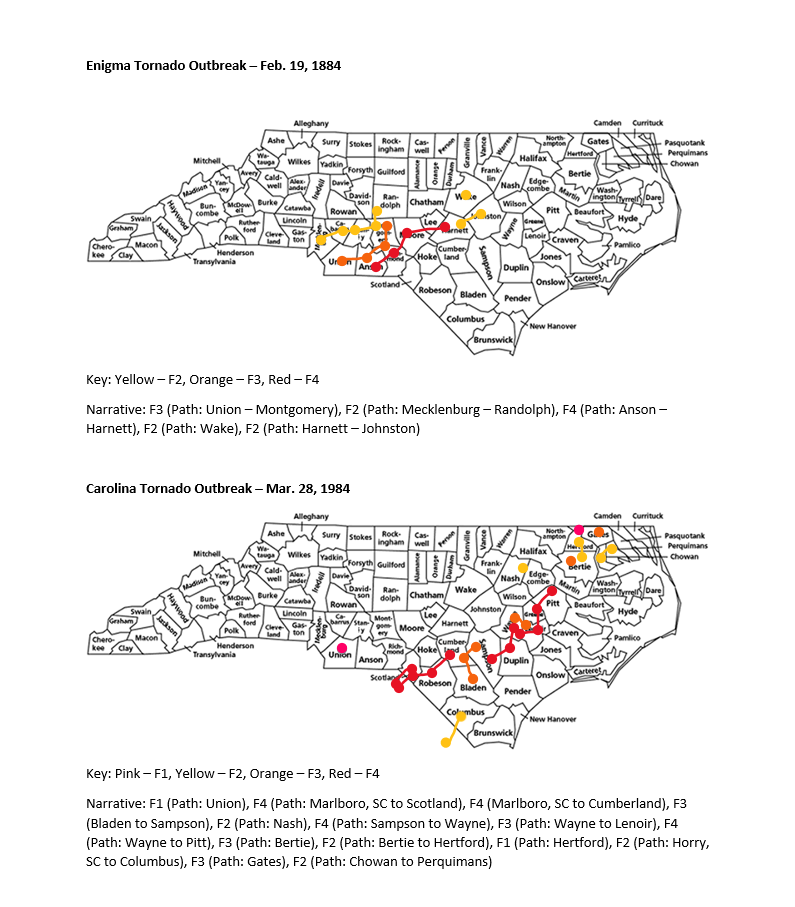
Wildfire Map:
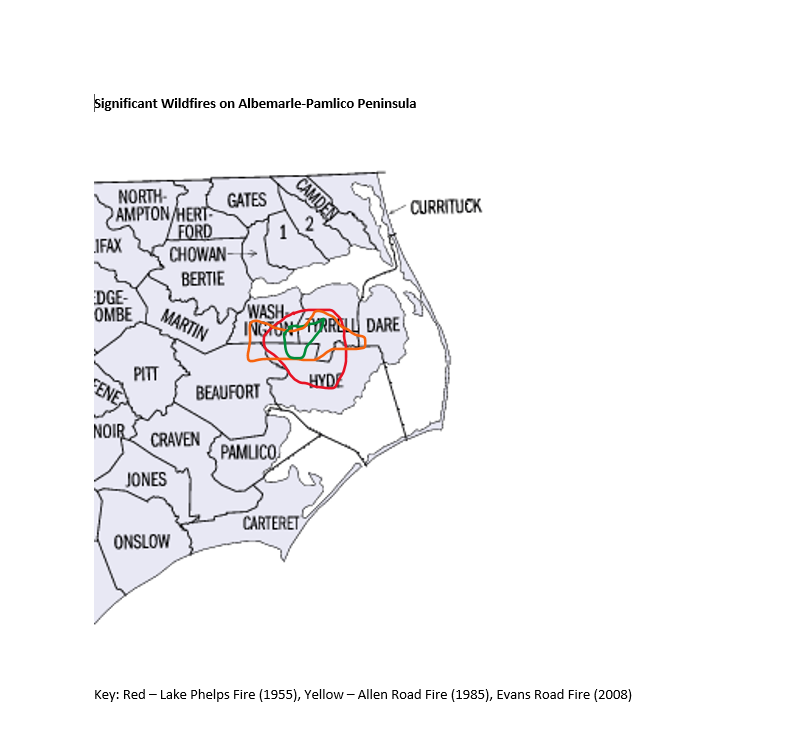
If you cannot access the images, please visit our blog: https://ncarchives.wpcomstaging.com/2023/09/27/resiliency-in-the-face-of-natural-disasters-other-storms-and-natural-disasters/
Sources:
The Floods of July, 1916: How the Southern Railway Organization Met an Emergency, 1917, Outer Banks History Center Monographs, ID: 33BOK-0-293 https://digital.ncdcr.gov/digital/collection/p249901coll37/id/4917/rec/41
Flood Near Railroad Depot, Asheville, North Carolina, 1916 (1998), General Negative Collection, Record ID: N.98.10.47 https://axaem.archives.ncdcr.gov//solrDetailPages/series/NCA/Series_detail.html?fq=seriesRid:252484
The Lincoln County News, 27 Jul 1916, Pg. 1, “Railway People Hard at It,” LinLCN.4
An Interview with Frances Cullom Morgan (b. 1948), 2021-05-19 [1:00:25] ID: OH.GEN.001 https://axaem.archives.ncdcr.gov//solrDetailPages/series/NCA/Series_detail.html?fq=seriesRid:1154702
The Rocky Mount Evening Telegram, Rocky Mount, NC, 7 Mar 1962, Pg. 1 “Outer Banks Area Isolated by Big Storm,” [Newspapers.com]
Spen-a-Rest Beach Cottages, Kitty Hawke, NC, March 1962 just after the Ash Wednesday Storm, 2015; 1962 ID: N.2015.3.3 https://axaem.archives.ncdcr.gov//solrDetailPages/series/NCA/Series_detail.html?fq=seriesRid:258979
Red Springs Citizen Photograph Collection, 1984 TO 2005, ID: PHC.296 https://axaem.archives.ncdcr.gov//solrDetailPages/series/NCA/Series_detail.html?fq=seriesRid:1144282
News and Observer, Raleigh, NC, 01 April 1984, Pg. 1, “From Ravaged Ruins, Spirit of Recovery Stirs in Red Springs,” [Newspapers.com]
Indian Affairs Record Group, Tornado Disaster, 1984, ID: SR.111.6.025 https://axaem.archives.ncdcr.gov//solrDetailPages/series/NCA/Series_detail.html?fq=seriesRid:1140402
Forest Resources Record Group, Fire Control Section: Fire Reports File, ID: 84.14 https://axaem.archives.ncdcr.gov//solrDetailPages/series/NCA/Series_detail.html?fq=seriesRid:695586
The Robesonian, Lumberton, NC, 5 Apr. 1955, Pg. 1, 4 “Forest Fires Rage in Eastern Areas,” and Pg. 4 “Losses Mount as Fires Rage Out of Control,” [Newspapers.com]

Wednesday Sep 13, 2023
Resiliency in the Face of Natural Disasters: North Carolina Hurricanes
Wednesday Sep 13, 2023
Wednesday Sep 13, 2023
North Carolina is no stranger to hurricanes. According to the National Hurricane Center, North Carolina is number 4 on the list of states most affected by hurricanes and throughout the state’s recorded history, hurricanes have been responsible for nearly 1,000 total fatalities and over $15 billion in damages. Yet time and time again, the citizens of North Carolina have shown their resilient nature in the face of these storms. This episode showcases four stories of resiliency brought on by four of the strongest hurricanes in our state’s history. Join us as we discuss Jesse Stevens Taylor’s dedication to her storm warning post during Hurricane Hazel, Rasmus Midgett’s heroic one-man rescue after the San Ciriaco Hurricane, New Bern’s preparation for the Revolutionary War amid the Independence Hurricane, and the town of Princeville’s persevering spirit after Hurricane Floyd. Whether it’s individuals risking their lives for others, agencies funneling resources into rescue operations or communities coming together to rebuild, North Carolinians are absolutely resilient!
Hurricane Path Maps:
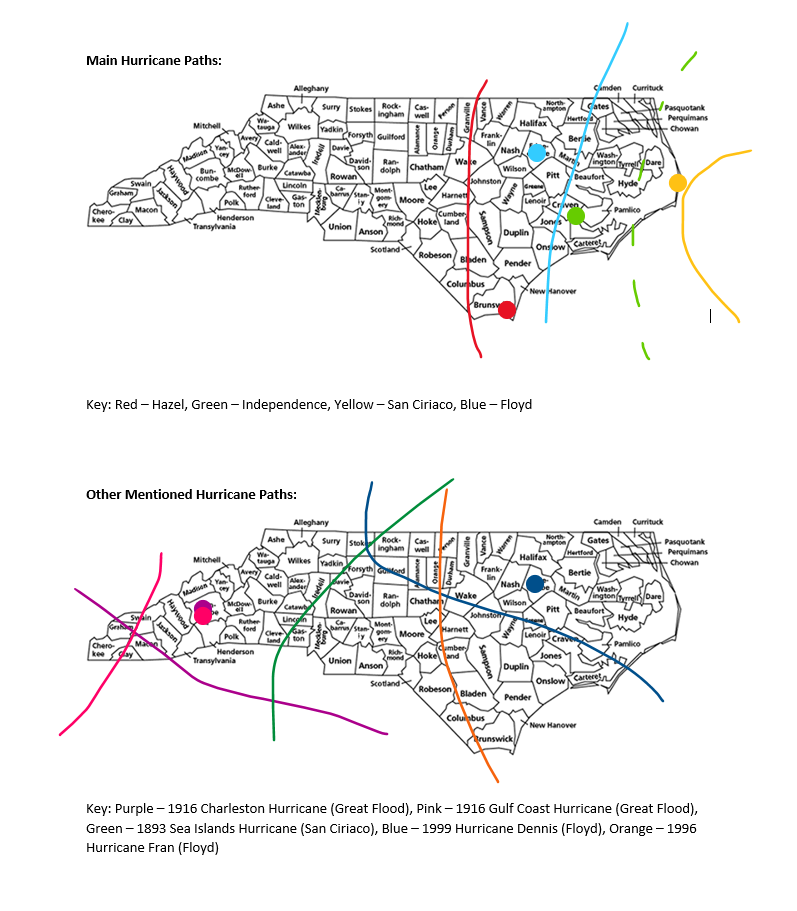
If you cannot access images, please visit our blog: https://ncarchives.wpcomstaging.com/2023/09/13/resiliency-in-the-face-of-natural-disasters-north-carolina-hurricanes/
Sources:
“Weather Watcher,” Our State Magazine, May 2006, Vol. 73, no. 12, State Library, https://digital.ncdcr.gov/Documents/Detail/our-state/1100309
Governor Luther Hodges Papers, General Correspondence (Civil Defense subject file) Box 260. SR.367.1 https://axaem.archives.ncdcr.gov//solrDetailPages/series/NCA/Series_detail.html?fq=seriesRid:738923
Carolina Power and Light Photograph Collection, Hurricane Hazel ID: PhC.68.1.471.1-4 https://axaem.archives.ncdcr.gov//solrDetailPages/series/NCA/Series_detail.html?fq=seriesRid:70597
“North Carolina’s Hurricane History: Fourth Edition, Updated with a Decade of New Storms from Isabel to Sandy,” Jay Barnes, UNC Press Books, 2013
Herbert Hutchinson Brimley Photograph Collection, 1880-1977 - Wreck of the Priscilla, Hatteras, NC, 1899. ID: PhC.42.Bx6.Boats.F19 https://axaem.archives.ncdcr.gov//solrDetailPages/series/NCA/Series_detail.html?fq=seriesRid:912431
The Story of Rasmus Midgett: Lifesaver, 1900-1999, ID: VT.119 https://axaem.archives.ncdcr.gov//solrDetailPages/series/NCA/Series_detail.html?fq=seriesRid:866110
“Hurricane of Independence: The Untold Story of the Deadly Storm at the Deciding Moment of the American Revolution,” Tony Williams, Sourcebooks, Inc., 2009
British Records, Royal Observatory, Charles Town, [South Carolina]. William De Brahm [surveyor general, southern department] to the Earl of Dartmouth [William Legge, secretary of state]. 8 Dec., 1775 ID: 21.20.64.1 https://axaem.archives.ncdcr.gov//solrDetailPages/series/NCA/Series_detail.html?fq=seriesRid:629462
North Carolina Newspaper Collection, Virginia Gazette or Norfolk Intelligencer, “Extract of a Letter from Newbern, in North Carolina, dated September 9, 1775,” 21 Oct 1775, page 2, NSP.5 https://research.colonialwilliamsburg.org/DigitalLibrary/va-gazettes/VGSinglePage.cfm?issueIDNo=75.DH.49&page=2&res=LO
Temporary Housing Section, Information Management Unit: Photograph File, 1999-2002 ID: SR.56.7 https://axaem.archives.ncdcr.gov//solrDetailPages/series/NCA/Series_detail.html?fq=seriesRid:659101
Governor James Hunt, Emergency Management File, 1999-2001. SR.374.32 https://axaem.archives.ncdcr.gov//solrDetailPages/series/NCA/Series_detail.html?fq=seriesRid:748121
Water damage in Princeville, North Carolina, Hurricane Floyd, October 13, 1999, 1999 ID: N.2000.2.49 https://axaem.archives.ncdcr.gov//solrDetailPages/series/NCA/Series_detail.html?fq=seriesRid:254662

Wednesday Mar 01, 2023
Ballads and Banjos and Fiddles, Oh My: Appalachian Music Spotlight
Wednesday Mar 01, 2023
Wednesday Mar 01, 2023
Appalachian music has a rich history in western North Carolina. Native American and African American music cultures melded with the ballad-singing traditions of Scots-Irish settlers in the 1700s. In the years that followed, western and piedmont musicians crafted signature styles of banjo picking in old-time and bluegrass music. Today, the sounds of Appalachia can be heard in a range of musical genres, from country to blues and beyond. In this episode, oral history interns Fiona Allen and Bree Dumont introduce the Connecting the Docs crew to some Appalachian music traditions as we listen to Ashe County fiddler Howard Miller, explore the history of the banjo, and learn how musicians and historians alike have worked to preserve this unique heritage.
Sources Mentioned:
Miller, Howard, and Miller, Haroldean, c. 1970s, Unpublished cassette tape recording. Included in National Historic Register nomination AH0023, prepared by Sarah Woodard, approved September 24, 2001. https://files.nc.gov/ncdcr/nr/AH0023.pdf
Sharp, C. J. (1973). English Folk Songs from the Southern Appalachians, 1973. Oxford University Press. Outer Banks History Center, OBHC:15C4.
North Carolina Arts Council Record Group. Folklife Section: Projects File, 1852-2013, bulk 1990-2010. Finding aid available in DOC: https://axaem.archives.ncdcr.gov/solrDetailPages/series/NCA/Series_detail.html?fq=seriesRid:703807
Lunsford, B. L. (1925). “Old Gray Mare.” Robert Winslow Gordon Cylinder Collection, American Folklife Center, Library of Congress. Available at https://www.loc.gov/audio/?q=Bascom%20Lunsford&loclr=fbafc&fbclid=IwAR2XizdU1GGzqy3UqWuAMmt08VFMjnfN6axeFjt6sUPrvv45vbOht95jdIs
North Carolina Folklore Journal, 1948-2019, published by North Carolina Folklore Society. Available at https://digital.ncdcr.gov/digital/custom/nc-folklore-journal.

Wednesday Feb 15, 2023
Call the Granny Woman: Appalachian Dialect Spotlight
Wednesday Feb 15, 2023
Wednesday Feb 15, 2023
The dialect traditionally spoken in the western parts of North Carolina goes by many names—Smoky Mountain English, Southern Mountain Talk, and Appalachian Dialect, to name a few. In this episode, oral history interns Fiona Allen and Bree Dumont lead host John Horan and guests Brooke Csuka and Josh Hager on a lexicological journey through this most colorful patois. Learn about how this dialect combines influences from surrounding states as well as multiple cultures, including members of the Cherokee Nation, the African diaspora, and immigrants from all over western Europe. Following the lesson, Fiona and Bree quiz John, Brooke, and Josh on the meaning of several words found in collections in the State Archives and State Library of North Carolina holdings. Do you know the Appalachian dialect meaning of “granny woman,” “airish,” or “booger”? You’ll find out those surprising definitions and many more in this installment of Connecting the Docs.
Sources Mentioned:
Suggested Archival Collections:
North Carolina Arts Council Record Group. Folklife Section: Resource File, 1796-2011. Finding aid available in DOC: https://axaem.archives.ncdcr.gov/solrDetailPages/series/NCA/Series_detail.html?fq=seriesRid:703805.
Western Regional Archives collections. Explore their finding aids on our website: https://archives.ncdcr.gov/researchers/finding-aids/western-regional-archives-finding-aids
Other Works Cited:
“Dialect Words in North Carolina.” Tar Heel Junior Historian, 2006 Spring, Volume 45, No. 2. North Carolina State Documents Collection, State Library of North Carolina.
George Hovis, “The Art of Healing: An Interview with Lee Smith.” North Carolina Literary Review, 2021, No. 30, Pages 7-21. North Carolina State Documents Collection, State Library of North Carolina.
Margaret Bauer, “Genre Conventions with a Half-Twist: An Interview with Charles Frazier.” North Carolina Literary Review, 2013, No. 22, Pages 21-42. North Carolina State Documents Collection, State Library of North Carolina.
North Carolina Department of Conservation and Development, “Conservation and Industry.” 1932, Volume 8, No. 1. North Carolina State Documents Collection, State Library of North Carolina.
North Carolina Department of the Secretary of State, “North Carolina Manual,” 1945-1946. North Carolina State Documents Collection, State Library of North Carolina.
Tar Heel Junior Historian, 1979 Fall, Volume 19, No. 1. North Carolina State Documents Collection, State Library of North Carolina.
Tar Heel Junior Historian, 2005 Fall, Volume 45, No. 1, Page 22. North Carolina State Documents Collection, State Library of North Carolina.

Wednesday Feb 01, 2023
Wednesday Feb 01, 2023
For this episode our HBCU/MIHE summer intern Tyanna West chats with renowned historian and author Dr. David Cecelski about Abraham Hankins Galloway, an abolitionist, union spy, and North Carolina state senator from Brunswick County. Cecelski’s biography, The Fire of Freedom: Abraham Galloway and the Slaves’ Civil War, illuminates a portrait of this little-known hero who ascended from the bondage of slavery to become one of the most important Black leaders during the Civil War and Reconstruction. Cecelski shares his research process, what drew him to the life of Abraham Galloway, and why he thinks many don’t know or share Galloway's story.
Sources mentioned:
Cecelski, David S. 2015. The Fire of Freedom: Abraham Galloway and the Slaves’ Civil War. Chapel Hill: University Of North Carolina Press.

Wednesday Jan 18, 2023
Wednesday Jan 18, 2023
Each summer the Outer Banks History Center welcomes an intern to its archives on Roanoke Island. Named after the History Center’s founder and legendary Outer Banks historian, David Stick, the annual internship offers students pursuing graduate degrees in library science the opportunity to engage in a range of projects. In this week’s episode, the 2022 summer intern and dual-degree graduate student at Simmons University, Johnna Purchase, shares her experience processing the John Wilson IV Papers, which document the range of contributions Wilson made to the development of the town of Manteo through his many years of service as the town’s mayor. Through his work as a professional architect, Wilson’s designs proved essential to developing the island vernacular style of building unique to the Outer Banks. Purchase joins host John Horan and regular panelist Josh Hager to discuss her time processing an archival collection, conducting oral history with a local fishing legend from Ocracoke, creating a reading room exhibit, her chance meeting with the collection’s donor, and all the Outer Banks history, geography, and culture that surprised her along the way!
Sources Mentioned:
An Interview with Stanley Beacham, 2021. Oral History Interviews with Outer Banks Residents, AV.5214.50. Outer Banks History Center.
All other items discussed herein can be found in the John F. Wilson IV Papers, 1980-2008, ca. 1980s-2008, Outer Banks History Center.
